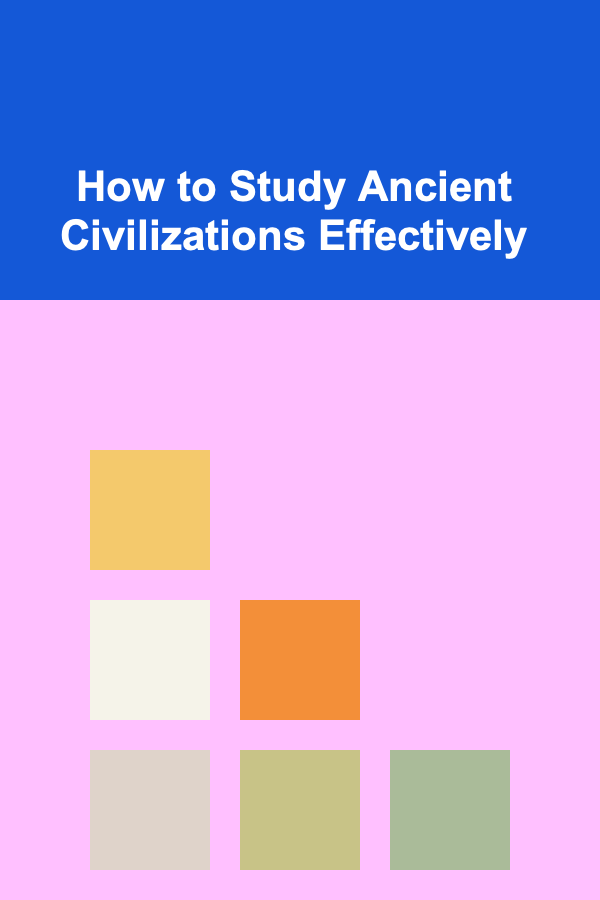
How to Study Ancient Civilizations Effectively
ebook include PDF & Audio bundle (Micro Guide)
$12.99$10.99
Limited Time Offer! Order within the next:

The study of ancient civilizations provides valuable insights into the development of human society, culture, and thought. By examining ancient civilizations such as Mesopotamia, Egypt, Greece, Rome, China, India, and others, we can trace the roots of modern-day institutions, technologies, and ideologies. However, studying ancient civilizations effectively requires a structured approach that blends interdisciplinary knowledge with critical thinking. This article will explore various strategies, methodologies, and tools to study ancient civilizations in a meaningful and comprehensive way.
The Importance of Studying Ancient Civilizations
Before delving into how to study ancient civilizations effectively, it is crucial to understand why studying these ancient cultures is important. Ancient civilizations laid the foundation for many aspects of modern life. For example:
- Political Systems: The idea of democracy from ancient Greece influenced modern political structures.
- Philosophy and Thought: The intellectual achievements of philosophers such as Socrates, Plato, and Confucius continue to shape contemporary thought.
- Technological Innovations: Ancient Egypt and Mesopotamia contributed innovations in agriculture, writing, and architecture.
- Cultural Practices: Art, literature, and religion from ancient civilizations have profound effects on our cultural heritage.
By studying ancient civilizations, we gain a deeper understanding of how societies evolve, how people lived in different periods of history, and how their legacies continue to influence us today.
Steps for Effective Study of Ancient Civilizations
Studying ancient civilizations is a multifaceted endeavor that requires thoughtful preparation, proper resources, and specific methodologies. Below are some key steps to help guide your study.
1. Choose a Civilization or Region of Interest
With the vast scope of ancient civilizations across the world, it is important to focus your study on one civilization or a specific region. Some civilizations, such as those of Egypt, Greece, and Rome, are well-documented and widely studied, while others, like the Indus Valley or the Maya civilization, might require more specialized research. Narrowing your focus will allow you to go deeper into the civilization's unique aspects.
- Mesopotamia: Known as the "Cradle of Civilization," Mesopotamia contributed greatly to early urbanization, writing systems, and governance.
- Ancient Egypt: Known for its monumental architecture, religious practices, and hieroglyphics.
- Ancient Greece and Rome: Foundations of Western philosophy, democracy, law, and warfare.
- Ancient China: Early technological advancements, Confucian philosophy, and the dynastic cycle.
- Ancient India: Rich in religious and philosophical traditions such as Hinduism, Buddhism, and Jainism.
- Mesoamerica and the Andes: Maya, Aztec, and Inca civilizations are known for their contributions to agriculture, astronomy, and social organization.
2. Understand the Sources of Information
To study ancient civilizations effectively, it's important to be aware of the sources of information. These sources can vary greatly depending on the civilization you're studying. Sources are generally classified into two categories:
- Primary Sources : These are firsthand accounts from the time period in question, such as inscriptions, texts, artifacts, architecture, and pottery. For example, the Epic of Gilgamesh or Egyptian tomb inscriptions are primary sources for Mesopotamian and Egyptian history.
- Secondary Sources: These are analyses and interpretations of primary sources, written by historians, archaeologists, and other experts. Secondary sources provide context, comparisons, and synthesize information from multiple primary sources. They are useful for understanding the broader implications of the ancient civilizations.
While primary sources are invaluable for direct insight into a civilization, secondary sources can help provide a more comprehensive understanding and interpretation of the ancient world.
3. Leverage Archaeological Evidence
Archaeology plays a central role in the study of ancient civilizations, as much of the evidence we have is physical rather than written. Excavations of ancient sites, artifacts, tools, pottery, and bones can reveal important details about daily life, trade, warfare, and social structure. Many ancient cities, such as Pompeii, Ur, and Harappa, have been unearthed by archaeologists, providing direct evidence of how people lived.
By studying archaeological evidence, you can better understand:
- Urban Development: How ancient cities were organized, constructed, and managed.
- Trade and Economy: What goods were exchanged and how people interacted with other cultures.
- Technology: Innovations in engineering, agriculture, and craftsmanship.
- Art and Religion: Depictions of gods, rituals, and cultural practices.
Archaeological findings often work in conjunction with written records, and the study of both can lead to a more complete picture of a civilization.
4. Engage with Interdisciplinary Approaches
Ancient civilizations cannot be studied in isolation. To truly understand them, it is essential to approach their study from multiple disciplines. Here are some of the key fields to consider:
- History: Study the chronology, political systems, and social structures of a civilization.
- Anthropology: Investigate cultural practices, beliefs, and daily life to understand how people interacted within their society.
- Linguistics: Examine ancient languages, writing systems, and texts. The deciphering of the Egyptian hieroglyphs or the Rosetta Stone are examples of linguistic breakthroughs that revealed much about ancient civilizations.
- Sociology: Explore the social dynamics and structures of ancient societies, including class systems, gender roles, and family structures.
- Religious Studies: Study the belief systems and religious practices of ancient civilizations, such as polytheism in Egypt, or the Vedic traditions in India.
The interdisciplinary approach ensures that your study is holistic, and helps you to understand the complexities of ancient civilizations beyond just their politics and wars.
5. Focus on Chronology and Context
One of the challenges when studying ancient civilizations is understanding the timeline and historical context. Many ancient civilizations spanned thousands of years, and their societies evolved over time. To effectively study an ancient civilization, it's crucial to develop a solid understanding of its chronology, key events, and transitions.
For example, in ancient Egypt, the history can be divided into periods such as:
- Old Kingdom (2686--2181 BCE): Known for the construction of the pyramids.
- Middle Kingdom (2055--1650 BCE): Marked by a period of stability and cultural flourishing.
- New Kingdom (1550--1070 BCE): Famous for powerful pharaohs like Ramses II and Tutankhamun.
Understanding the historical shifts between periods---whether due to internal reforms, external invasions, or natural disasters---helps you understand the overall trajectory of a civilization.
6. Use Modern Technology and Tools
The advent of digital technology has transformed the study of ancient civilizations, making it easier to access and analyze vast amounts of information. Here are some modern tools and technologies that can enhance your study:
- Digital Archives and Databases: Many universities, museums, and archaeological institutions now offer online access to collections of ancient texts, artifacts, and inscriptions.
- 3D Modeling and Virtual Reality: Some institutions are using VR to recreate ancient cities and monuments, offering immersive ways to explore these sites.
- Geographic Information Systems (GIS): GIS technology allows researchers to map out ancient sites and track changes in land use, urban development, and trade routes over time.
- DNA and Genetic Analysis: Modern science allows archaeologists to analyze ancient human remains to learn about migration patterns, diet, and disease.
These tools can bring new perspectives and enable more in-depth research into ancient civilizations, enhancing your understanding of their cultures.
7. Critically Analyze and Synthesize Information
As you collect information from various sources, it's important to critically analyze and synthesize the data. Ancient texts and archaeological evidence can often be fragmented or biased, and scholars may have differing interpretations of events or artifacts. It's essential to approach your study with a critical mindset, questioning the sources, considering alternative viewpoints, and being aware of the limitations of your evidence.
Critical analysis can involve:
- Cross-referencing sources: Compare different types of evidence (written records, artifacts, and archaeological findings) to corroborate claims.
- Recognizing Bias: Understand the potential biases in primary sources, particularly in texts written by elites or victors in wars.
- Considering Modern Interpretations: Take into account how modern perspectives or theories may influence the way ancient civilizations are understood.
By synthesizing diverse sources and perspectives, you will develop a more nuanced understanding of ancient civilizations.
8. Join Discussions and Communities
Engaging in discussions with other students, scholars, and enthusiasts of ancient civilizations can greatly enhance your learning experience. Joining academic forums, attending lectures or webinars, and participating in study groups can expose you to new ideas, research, and interpretations. Collaborative learning helps refine your own understanding and provides opportunities to ask questions and debate findings.
9. Apply Knowledge to Modern Contexts
One effective way to solidify your understanding of ancient civilizations is by applying what you learn to modern contexts. Consider how ancient civilizations have influenced contemporary issues, such as governance, architecture, or ethics. Reflect on how lessons from ancient history can be applied to current global challenges.
For instance, studying ancient democracy in Athens can provide valuable insights into modern political systems, while examining the technological advancements of ancient Rome may inform contemporary engineering practices.
Conclusion
Studying ancient civilizations is an intellectually rewarding pursuit that offers a deeper understanding of humanity's shared history. To study ancient civilizations effectively, one must adopt a structured approach, incorporating a variety of disciplines, engaging with different types of sources, and leveraging modern tools and technologies. By critically analyzing and synthesizing information, engaging with communities, and applying knowledge to modern issues, we can gain valuable insights into the legacies of ancient cultures and their continued relevance in the present day. The study of ancient civilizations is not just an exploration of the past; it is a path to understanding who we are as a global society.

How to Create and Sell NFTs: A Comprehensive Guide
Read More
How to Shop for Clothes Secondhand and Save Big
Read More
How to Use Technology to Streamline Your Meeting Preparation Checklist
Read More
How to Explore the Truth Behind MKUltra
Read More
How To Choose the Best Time and Place for Stargazing
Read More
How To Practice Deep Work for Maximum Productivity
Read MoreOther Products

How to Create and Sell NFTs: A Comprehensive Guide
Read More
How to Shop for Clothes Secondhand and Save Big
Read More
How to Use Technology to Streamline Your Meeting Preparation Checklist
Read More
How to Explore the Truth Behind MKUltra
Read More
How To Choose the Best Time and Place for Stargazing
Read More